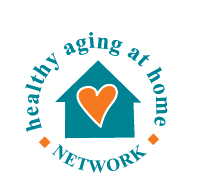We’re launching a community integrated health network for senior services in Southeast Michigan and beyond
 The Center for Health and Research Transformation at the University of Michigan has recently received grants from the federal Administration for Community Living and the Ann Arbor Area Community Foundation to expand and enhance a local collaborative that provides medically tailored meals, and referrals to home and community-based services, to vulnerable seniors and individuals with disabilities.
The Center for Health and Research Transformation at the University of Michigan has recently received grants from the federal Administration for Community Living and the Ann Arbor Area Community Foundation to expand and enhance a local collaborative that provides medically tailored meals, and referrals to home and community-based services, to vulnerable seniors and individuals with disabilities.
The network, currently comprised of community-based organizations in Washtenaw County because the project was incubated in the Washtenaw Health Initiative, will soon expand to include community-based organizations in other counties in Southeast Michigan and beyond.
In 2019, with funding from the Glacier Hills Legacy Fund at the Ann Arbor Area Community Foundation, a Vital Seniors Initiative was launched to facilitate systemic improvements to Washtenaw County’s senior services. The original Vital Seniors grantees were joined by Catholic Social Services of Washtenaw County, a leader in the local aging sector, to build a senior services network that now includes:
- the Area Agency on Aging 1-B,
- Catholic Social Services of Washtenaw County,
- the Chelsea Senior Center,
- Jewish Family Services of Washtenaw County, and
- Ypsilanti Meals on Wheels.
 The Center for Health and Research Transformation, as backbone to the Washtenaw Health Initiative, has provided strategic, administrative, and fiduciary support to this network, helping them identify shared values and goals, and chart a course to achieve them. With this assistance, network members worked together to design a Home Nutrition+ pilot to serve vulnerable adults in Washtenaw County during the COVID-19 pandemic.
The Center for Health and Research Transformation, as backbone to the Washtenaw Health Initiative, has provided strategic, administrative, and fiduciary support to this network, helping them identify shared values and goals, and chart a course to achieve them. With this assistance, network members worked together to design a Home Nutrition+ pilot to serve vulnerable adults in Washtenaw County during the COVID-19 pandemic.
Priority Health partnered with this network, referring health plan members who were eligible for both Medicare and Medicaid, and who had been diagnosed with diabetes or heart disease, to the Home Nutrition+ pilot.
The model was built on evidence that links medically tailored meals to improvements in health and wellness and that shows that partnering with social service entities can lead to better health outcomes by expanding the care team into the community to meet often overlooked social needs.
Pilot program participants received a health and social services needs assessment, home-delivered medically-friendly meals, and referrals to home and community-based services to meet additional needs. An external analysis by Sue Ann Savas of the University of Michigan School of Social Work found that the pilot program participants experienced improvements in overall health and wellness, reductions in falls and unnecessary hospitalizations, and more.
With the Administration for Community Living and Ann Arbor Area Community Foundation grants, the collaborative will now be formalized as a Community Integrated Health Network (CIHN) and will seek to recruit additional community-based organizations beyond Washtenaw County. CIHNs work with health plans and health systems to deliver home and community-based services, such as medically-tailored meals.
Through new partnerships, the health network and the Home Nutrition+ program will be expanded to reach vulnerable populations in additional counties with high levels of poverty and significant aging populations.
“Building a Community Integrated Health Network is a win-win for seniors and other vulnerable adults,” says Deana Smith, project lead and program manager for the Washtenaw Health Initiative. “Not only do seniors receive care from the community-based organizations they know and trust, but they can be assured that these organizations have the resources needed to continue providing services that will allow them to age comfortably and independently.”
“The Ann Arbor Area Community Foundation, through the Glacier Hills Legacy Fund, is proud to support this initiative with the Administration on Community Living,” says Chris Lemon, senior community investment officer for the foundation. “Programs such as the Home Nutrition+ pilot are vital in addressing systemic gaps and in building solutions that prioritize our community’s most vulnerable members. We look forward to seeing how CHRT and its partners usher this work forward in Washtenaw County and beyond.”
Michigan’s Plan on Aging for 2021-2023 seeks to ensure that older adults are able to age in place when that is their desire. CHRT and the Vital Seniors cohort will support this statewide vision by helping network partners coordinate care for aging adults while addressing their unmet social needs.
HRT’s 2021-2024 community care hub infrastructure development project was supported by the Administration for Community Living (ACL), U.S. Department of Health and Human Services (HHS) as part of a financial assistance award totaling $381,001 with 76.5% ($291,564) funded by ACL/HHS and 23.5% ($89,437) funded by non-government source(s). The contents of this publication are those of the author(s) and do not necessarily represent the official views of, nor an endorsement, by ACL/HHS, or the U.S. Government.